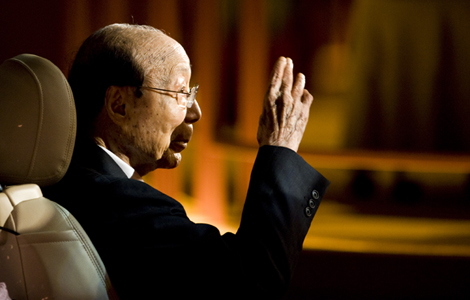RMB goes further on market-oriented course in 2014
Updated: 2014-01-17 13:37
(Xinhua)
|
|||||||||||
BEIJING - As China's total exports and imports surpassed $4 trillion for the first time in 2013, recent rates of the Chinese currency Renminbi (RMB) against the US dollar have hit a new record high, infiltrating six is possible in the very near future.
Experts believed that RMB would go further on the market-oriented course in 2014, which means exchange rates would be decided by supply and demand, and that its internationalization process could be accelerated to respond to strong global demand for the currency.
Some of them told Xinhua that they have predicted the Chinese currency, which appreciated against the US dollar by 3 percent in 2013, would continue to increase in value by around 2 percent in 2014.
In fact, experts were divided on RMB's exchange rate, arguing whether it has been overvalued or undervalued, both of the situations have negative impacts to the Chinese economy. However, the core issue of RMB may lie in the formation mechanism of its exchange rate, not the rate itself, or namely "the decisive role of the market."
Chinese authorities reaffirmed repeatedly that China would devote itself to pushing forward exchange rate reform to release RMB's flexibility and let the market play the basic role in its formation.
Moreover, the currency's internationalization perspective would be more aspiring in the new year.
"The renminbi is evolving at a remarkable pace," Patrick Zweifel, chief economist at Pictet Asset Management, wrote in an article headlined "Era of renminbi dawns as China's influence grows" and carried in the British newspaper Financial Times.
"As a medium of exchange and unit of account, it is on course to acquire international status in three years; in 10, it may unseat the US dollar as the world's reserve currency," he said.
The Washington Post columnist Neil Irwin echoed his view, saying "China's currency is fast becoming the US dollar's major competition for dominance in global trade."
He referred to a report by the Society for Worldwide Interbank Financial Telecommunication (SWIFT), saying China's currency was used in 8.66 percent of global trade finance transactions in October 2013, ranking the No 2 most widely used currency for trade finance.
The change of RMB's status, however, can not take place without profound changes in the global financial picture, experts said.
Against the backdrop of the US dollar's dominance and the lack of alternatives, which could result in over-dependence on the US currency and accumulation of risks, Stuart Oakly, general manager of Asian currency trading with Nomura Securities, called RMB "the global optimum currency."
For the renminbi, the point does not lie in the economic data but the unprecedented structural needs of global sovereign debt funds, institutions and retail investors, he said. In comparison with any other currency, the yuan is more promising.
Related Stories
Renminbi transactions developing rapidly in London 2014-01-16 10:53
Addiction for stronger RMB spells trouble 2014-01-16 09:37
China yuan strengthens to new high against USD 2014-01-14 11:13
Renminbi poised 'to weaken slightly' this year 2014-01-10 08:07
RMB rings out 2013 at new high 2014-01-02 08:09
Today's Top News
Xi writes to Chinese in German colleges
China software to rival Android
Will China dominate the world?
Mainland policy lures HK students
Obama tells Germans he will not wiretap
Party is over for SOEs conferences
Egypt referendum wins support
Home prices continue to climb
Hot Topics
Lunar probe , China growth forecasts, Emission rules get tougher, China seen through 'colored lens', International board,
Editor's Picks

|

|

|

|

|

|





